初一下学期英语笔记
- 格式:doc
- 大小:172.00 KB
- 文档页数:21
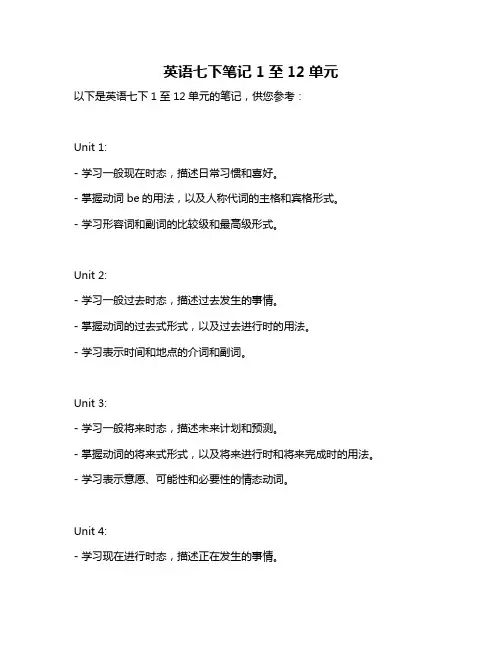
英语七下笔记1至12单元以下是英语七下1至12单元的笔记,供您参考:Unit 1:- 学习一般现在时态,描述日常习惯和喜好。
- 掌握动词be的用法,以及人称代词的主格和宾格形式。
- 学习形容词和副词的比较级和最高级形式。
Unit 2:- 学习一般过去时态,描述过去发生的事情。
- 掌握动词的过去式形式,以及过去进行时的用法。
- 学习表示时间和地点的介词和副词。
Unit 3:- 学习一般将来时态,描述未来计划和预测。
- 掌握动词的将来式形式,以及将来进行时和将来完成时的用法。
- 学习表示意愿、可能性和必要性的情态动词。
Unit 4:- 学习现在进行时态,描述正在发生的事情。
- 掌握动词的现在分词形式,以及现在进行时的用法。
- 学习表示情感和感觉的动词和形容词。
Unit 5:- 学习一般现在时态的被动语态,描述被动情况。
- 掌握动词的被动语态形式,以及by引导的方式状语从句。
- 学习表示位置和方向的介词和副词。
Unit 6:- 学习形容词和副词的用法,描述事物的性质和程度。
- 掌握形容词和副词的位置和顺序,以及比较级和最高级的用法。
- 学习表示比较关系的连词和介词。
Unit 7:- 学习代词的用法,代替名词或名词短语。
- 掌握人称代词、物主代词、反身代词和不定代词的形式和用法。
- 学习表示目的、原因、条件和结果的连词和介词。
Unit 8:- 学习定冠词和不定冠词的用法,修饰名词。
- 掌握定冠词the、不定冠词a/an的形式和用法,以及冠词的省略情况。
- 学习表示数量、种类和单位的介词和副词。

1.hard-working“勤勉的,努力工作的"作定语work hard动副结构短语2.be patient with sb.“对某人有耐心“3.take(one’s)time to do sth.“花费时间做某事”It takes sb.some time to do sth.=sb.spend some time on sth./(in)doing sth.“做某事需花费……时间”4.like doing sth.“喜欢做某事”(表喜欢、爱好某种经常的或习惯性的活动)like to do sth.“喜欢去做”(表喜欢、爱好某种特定的或具体的活动)Eg.I like visiting friends on Sundays and I like to visit Tom this Sunday.like sb.to do sth.“喜欢某人做某事”Eg.We all like him to play the guitarlike介词Eg.She looks like her father.5.witha.同,与,和talk with a friendb.用(工具、手段)cut meat with a knifec.在……身边(随身携带)Do you have any money with you?Take an umbrella with you?d.以……,带着……She often talks with smile.6.always频率副词“总是”be动词或助动词之后,行为动词之前Eg.Our teacher is always kind to us.“一直;(将)永远;老是(用于进行时)”Eg.I will always remember your words.She is always moving things around.He has always been the tutor.always>usually>often 7.probablyadv.“大概;很可能”;adj.“可能的,大概”Eg.I’ll probably be a doctor in the future.It is probable to finish the job before dark.8.in the world世界上all over the world=throughout the world全世界9.never adv.是ever的否定形式,用于加强否定语气。
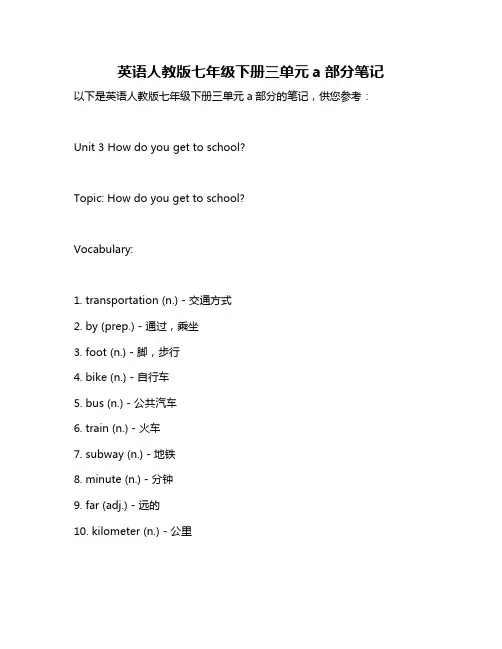
英语人教版七年级下册三单元a部分笔记以下是英语人教版七年级下册三单元a部分的笔记,供您参考:Unit 3 How do you get to school?Topic: How do you get to school?Vocabulary:1. transportation (n.) - 交通方式2. by (prep.) - 通过,乘坐3. foot (n.) - 脚,步行4. bike (n.) - 自行车5. bus (n.) - 公共汽车6. train (n.) - 火车7. subway (n.) - 地铁8. minute (n.) - 分钟9. far (adj.) - 远的10. kilometer (n.) - 公里Grammar:1. Present Simple Tense - 一般现在时态2. Prepositions of Method - 表示方式的介词(如by)3. Adverbs of Time - 时间状语(如every day, sometimes)4. Adverbs of Frequency - 频率状语(如usually, never)5. Adverbs of Degree - 程度状语(如very, a little)6. Adverbs of Place - 地点状语(如here, there)7. Adverbs of Manner - 方式状语(如slowly, quickly)8. Adverbs of Purpose - 目的状语(如to go to school, to buy a book)9. Adverbs of Condition - 条件状语(如if, unless)10. Adverbs of Time and Place - 时间地点状语(如when, where)Example Sentences:1. I get to school by bus every day. (我每天乘公交车去学校。
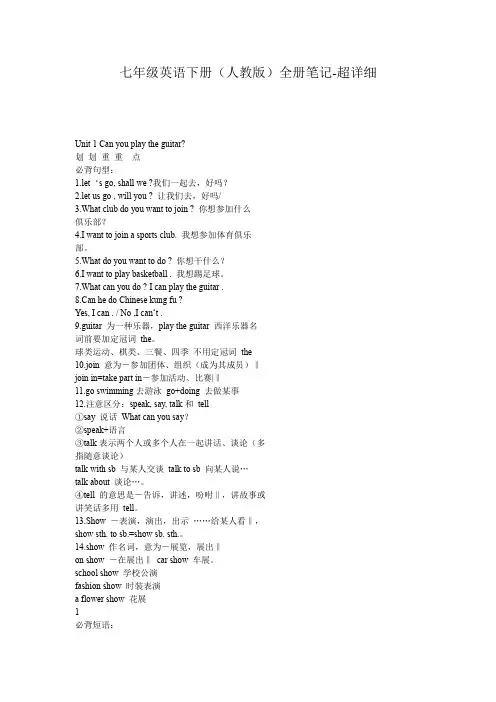
七年级英语下册(人教版)全册笔记-超详细Unit 1 Can you play the guitar?划划重重点必背句型:1.let‘s go, shall we ?我们一起去,好吗?2.let us go , will you ? 让我们去,好吗/3.What club do you want to join ? 你想参加什么俱乐部?4.I want to join a sports club. 我想参加体育俱乐部。
5.What do you want to do ? 你想干什么?6.I want to play basketball . 我想踢足球。
7.What can you do ? I can play the guitar .8.Can he do Chinese kung fu ?Yes, I can . / No ,I can‘t .9.guitar 为一种乐器,play the guitar 西洋乐器名词前要加定冠词the。
球类运动、棋类、三餐、四季不用定冠词the10.join 意为―参加团体、组织(成为其成员)‖join in=take part in―参加活动、比赛|‖11.go swimming去游泳go+doing 去做某事12.注意区分:speak, say, talk和tell①say 说话What can you say?②speak+语言③talk表示两个人或多个人在一起讲话、谈论(多指随意谈论)talk with sb 与某人交谈talk to sb 向某人说…talk about 谈论…。
④tell 的意思是―告诉,讲述,吩咐‖,讲故事或讲笑话多用tell。
13.Show ―表演,演出,出示……给某人看‖,show sth. to sb.=show sb. sth.。
14.show 作名词,意为―展览,展出‖on show ―在展出‖car show 车展。
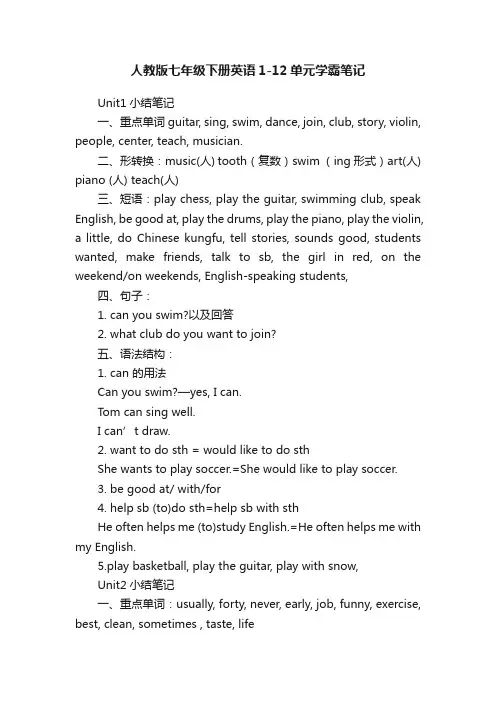
人教版七年级下册英语1-12单元学霸笔记Unit1小结笔记一、重点单词guitar, sing, swim, dance, join, club, story, violin, people, center, teach, musician.二、形转换:music(人) tooth(复数)swim (ing形式)art(人) piano (人) teach(人)三、短语:play chess, play the guitar, swimming club, speak English, be good at, play the drums, play the piano, play the violin, a little, do Chinese kungfu, tell stories, sounds good, students wanted, make friends, talk to sb, the girl in red, on the weekend/on weekends, English-speaking students,四、句子:1. can you swim?以及回答2. what club do you want to join?五、语法结构:1. can 的用法Can you swim?—yes, I can.Tom can sing well.I can’t draw.2. want to do sth = would like to do sthShe wants to play soccer.=She would like to play soccer.3. be good at/ with/for4. help sb (to)do sth=help sb with sthHe often helps me (to)study English.=He often helps me with my English.5.play basketball, play the guitar, play with snow,Unit2小结笔记一、重点单词:usually, forty, never, early, job, funny, exercise, best, clean, sometimes , taste, life二、词形变换:tooth(复数) early (反义词)job(同义词)run(名词)life(复数)三、短语:get up, get dressed, take a shower, radio station, at night, on weekends, half an hour, a quarter to ten, do one’s homework, take a walk, e ither…or…, lots of, go to school/work, an interesting job, eat dinner, half past six, go home, go to bed early, eat quickly, get home, after school,四、句子:1、what time do you usually get up?2、when does she go to work?3、I sometimes play basketball for half an hour.4、that’s a funny time for breakfast.五、语法结构:1、when/what time +do/does+主语+动词原形+其他?2、时间表达法:顺读法如:7:20读作seven-twenty倒读法:此方法是“先读分钟数”,再读“钟点数”,使用此方法要注意两点:A、如果分钟数在30以内,就用“分钟数+past+钟点数”表示,介词past意为“过”。
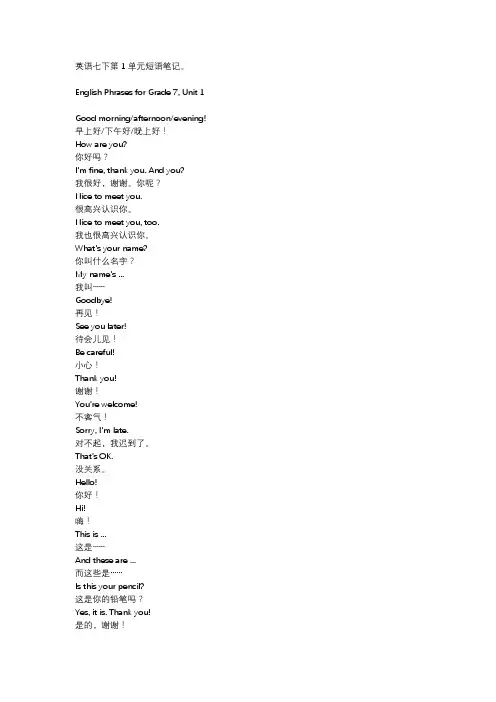
英语七下第1单元短语笔记。
English Phrases for Grade 7, Unit 1Good morning/afternoon/evening! 早上好/下午好/晚上好!How are you?你好吗?I'm fine, thank you. And you?我很好,谢谢。
你呢?Nice to meet you.很高兴认识你。
Nice to meet you, too.我也很高兴认识你。
What's your name?你叫什么名字?My name's ...我叫……Goodbye!再见!See you later!待会儿见!Be careful!小心!Thank you!谢谢!You're welcome!不客气!Sorry, I'm late.对不起,我迟到了。
That's OK.没关系。
Hello!你好!Hi!嗨!This is ...这是……And these are ...而这些是……Is this your pencil?这是你的铅笔吗?Yes, it is. Thank you!是的,谢谢!No, it isn't. Mine is blue.不,不是。
我的是蓝色的。
What about this one? Is this yours?那这个呢?这是你的吗?Yes, that's mine.是的,那是我的。
How do you spell it?你如何拼写它?Can you spell it, please?请你拼写一下好吗?What color is it?它是什么颜色的?It's black and white.它是黑白相间的。
The key is yellow.这把钥匙是黄色的。
The cup is my sister's.这个杯子是我姐姐的。
The jacket is nice.这件夹克很好看。
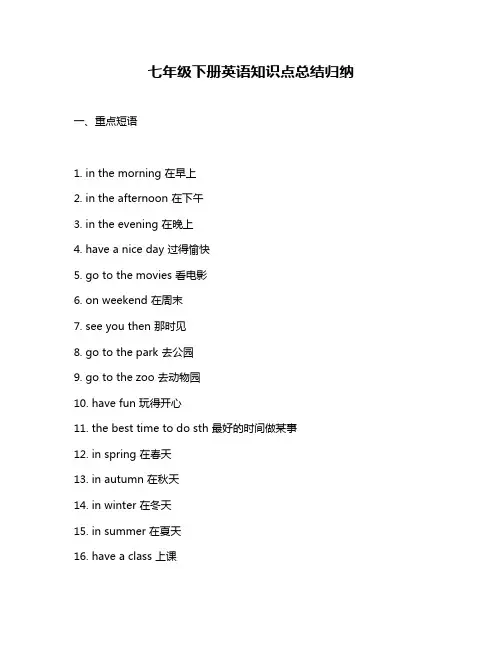
七年级下册英语知识点总结归纳一、重点短语1. in the morning 在早上2. in the afternoon 在下午3. in the evening 在晚上4. have a nice day 过得愉快5. go to the movies 看电影6. on weekend 在周末7. see you then 那时见8. go to the park 去公园9. go to the zoo 去动物园10. have fun 玩得开心11. the best time to do sth 最好的时间做某事12. in spring 在春天13. in autumn 在秋天14. in winter 在冬天15. in summer 在夏天16. have a class 上课17. have a swim 游泳18. have a picnic 野餐19. have a nap 小睡一会20. have fun playing with children 与孩子们一起玩耍21. the next day 第二天22. the day after tomorrow 后天23. the day before yesterday 前天24. the week after next 下下周25. the week before last 上上周26. three days ago 三天前27. two months ago 两个月前28. next Monday 下周一29. last Wednesday 上周三30. three weeks ago 三周前31. five years ago 五年前32. since 自从,因为。
表示一种因果关系,常跟完成时连用。
例如:since you were ill, I have kept you at home。
因为你病了,我一直让你呆在家里。
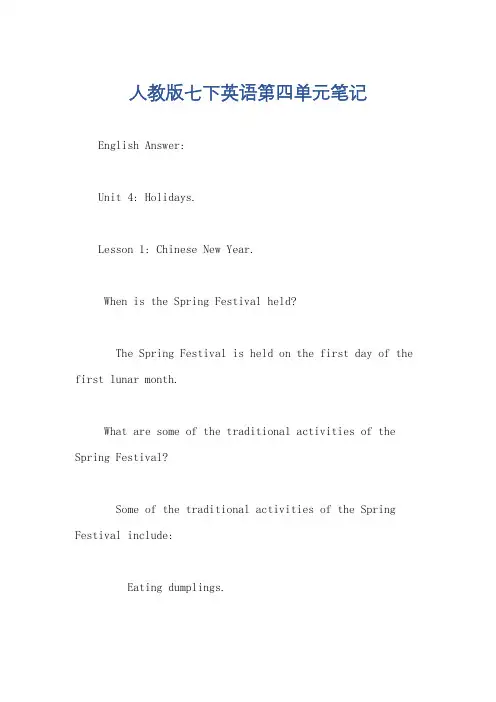
人教版七下英语第四单元笔记English Answer:Unit 4: Holidays.Lesson 1: Chinese New Year.When is the Spring Festival held?The Spring Festival is held on the first day of the first lunar month.What are some of the traditional activities of the Spring Festival?Some of the traditional activities of the Spring Festival include:Eating dumplings.Watching lion dances.Setting off fireworks.Giving red envelopes.Visiting family and friends.What is the significance of the Spring Festival?The Spring Festival is a time for family reunions and a celebration of the new year.Lesson 2: Christmas Day.When is Christmas Day celebrated?Christmas Day is celebrated on December 25th.What are some of the traditional activities of Christmas Day?Some of the traditional activities of Christmas Day include:Exchanging gifts.Decorating Christmas trees.Singing Christmas carols.Attending church services.Eating Christmas dinner.What is the significance of Christmas Day?Christmas Day is a Christian holiday that celebrates the birth of Jesus Christ.Lesson 3: New Year's Day.When is New Year's Day celebrated?New Year's Day is celebrated on January 1st.What are some of the traditional activities of New Year's Day?Some of the traditional activities of New Year's Day include:Watching fireworks.Making New Year's resolutions.Eating special foods.Singing Auld Lang Syne.What is the significance of New Year's Day?New Year's Day is a time to reflect on the past year and to look forward to the future.Lesson 4: Chinese Dragon Boat Festival.When is the Dragon Boat Festival held?The Dragon Boat Festival is held on the 5th day of the 5th lunar month.What are some of the traditional activities of the Dragon Boat Festival?Some of the traditional activities of the Dragon Boat Festival include:Eating zongzi.Watching dragon boat races.Wearing sachets.What is the significance of the Dragon Boat Festival?The Dragon Boat Festival is a time to commemorate the Chinese poet Qu Yuan.Lesson 5: Double Ninth Festival.When is the Double Ninth Festival held?The Double Ninth Festival is held on the 9th day of the 9th lunar month.What are some of the traditional activities of the Double Ninth Festival?Some of the traditional activities of the Double Ninth Festival include:Climbing mountains.Eating chrysanthemum cakes.Drinking chrysanthemum wine.What is the significance of the Double Ninth Festival?The Double Ninth Festival is a time to celebrate the elderly and to enjoy the autumn scenery.中文回答:第四单元,节日。
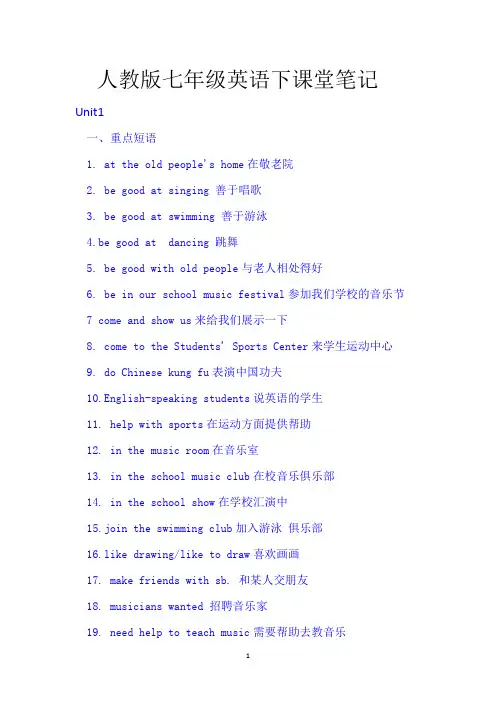
人教版七年级英语下课堂笔记Unit1一、重点短语1. at the old people's home在敬老院2. be good at singing 善于唱歌3. be good at swimming 善于游泳4.be good at dancing 跳舞5. be good with old people与老人相处得好6. be in our school music festival参加我们学校的音乐节7 come and show us来给我们展示一下8. come to the Students' Sports Center来学生运动中心9. do Chinese kung fu表演中国功夫10.English-speaking students说英语的学生11. help with sports在运动方面提供帮助12. in the music room在音乐室13. in the school music club在校音乐俱乐部14. in the school show在学校汇演中15.join the swimming club加入游泳俱乐部16.like drawing/like to draw喜欢画画17. make friends with sb. 和某人交朋友18. musicians wanted 招聘音乐家19. need help to teach music需要帮助去教音乐20. on the weekend/on weekends(在)周末21 play chess下国际象棋22. play games with people与人玩游戏23. play the drums敲鼓"24. play the guitar弹吉他25. play the piano 弹钢琴26. play the violin 拉小提琴"27. students wanted for the school show为学校演出招募学生28. tell stories讲故事29. the story telling club讲故事俱乐部30. talk with sb. about sth. 和某人谈论某事二、重点句型1.—Can you play the guitar or the violin?你会弹吉他还是拉小提琴?—I can play the guitar.我会弹吉他。
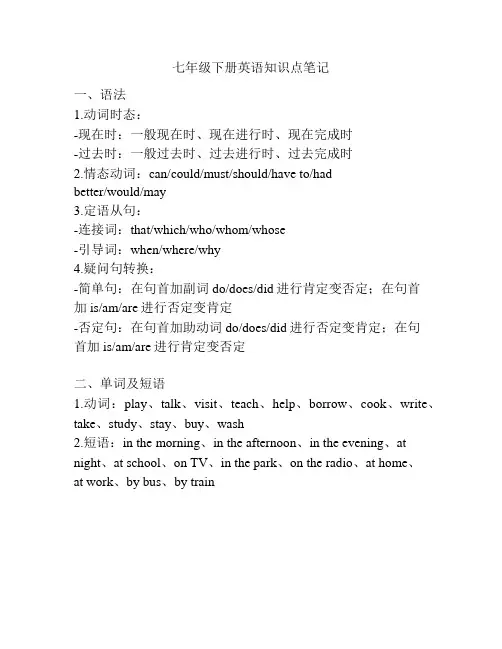
七年级下册英语知识点笔记
一、语法
1.动词时态:
-现在时:一般现在时、现在进行时、现在完成时
-过去时:一般过去时、过去进行时、过去完成时
2.情态动词:can/could/must/should/have to/had
better/would/may
3.定语从句:
-连接词:that/which/who/whom/whose
-引导词:when/where/why
4.疑问句转换:
-简单句:在句首加副词do/does/did进行肯定变否定;在句首
加is/am/are进行否定变肯定
-否定句:在句首加助动词do/does/did进行否定变肯定;在句
首加is/am/are进行肯定变否定
二、单词及短语
1.动词:play、talk、visit、teach、help、borrow、cook、write、take、study、stay、buy、wash
2.短语:in the morning、in the afternoon、in the evening、at night、at school、on TV、in the park、on the radio、at home、
at work、by bus、by train。
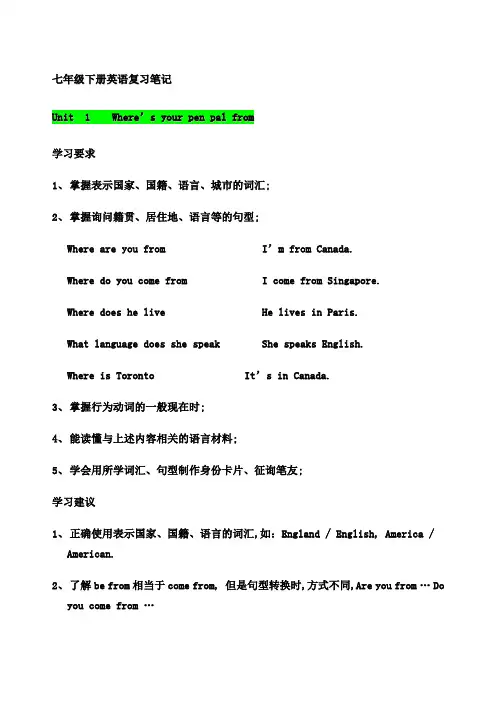
七年级下册英语复习笔记U n i t1W h e r e’s y o u r p e n p a l f r o m学习要求1、掌握表示国家、国籍、语言、城市的词汇;2、掌握询问籍贯、居住地、语言等的句型;Where are you from I’m from Canada.Where do you come from I come from Singapore.Where does he live He lives in Paris.What language does she speak She speaks English.Where is Toronto It’s in Canada.3、掌握行为动词的一般现在时;4、能读懂与上述内容相关的语言材料;5、学会用所学词汇、句型制作身份卡片、征询笔友;学习建议1、正确使用表示国家、国籍、语言的词汇,如:England / English, America /American.2、了解be from相当于come from, 但是句型转换时,方式不同,Are you from …Doyou come from …3、建议结合实情,增加谈论街道、楼院、门牌号的练习;4、学会用所学词汇、句型制作身份卡片、征询笔友;一.W h e r e+b e+主语+f r o m=W h e r e+d o/d o e s+主语+c o m e f r o mW h e r e a r e y o u f r o m=W h e r e d o y o u c o m e f r o mB e f r o m=c o m e f r o m联系动词实义动词例:S t o n e i s c o m e f r o m C h i n a.×注:b e动词与实义动词永远不能连用;二.国家国人国人复数语言首都t h e p e o p l e R e p u b l i c s o f C h i n a P.R.C.C h i n a C h i n e s e C h i n e s e C h i n e s e B e i j i n gC a n a d a C a n a d i a n C a n a d i a n s E n g l i s h,F r e n c h O t t a w aF r a n c e F r e n c h F r e n c h m e n F r e n c h P a r i sJ a p a n J a p a n e s e J a p a n e s e J a p a n e s e T o k y o t h e U n i t e d S t a t e s o f A m e r i c a A m e r i c a A m e r i c a n A m e r i c a n sE n g l i s h t h e u n i t e d K i n g d o mE n g l a n d E n g l i s h m a n E n g l i s h m e n E n g l i s h L o n d o nA u s t r a l i a A u s t r a l i a n A u s t r a l i a n s E n g l i s hC a n b e r r aW h e r e d o e s h e l i v e H e l i v e s i n B e i j i n g.W h e r e对地点提问的秘诀是:一定,二改,三组合一定,确定疑问词W h e r e二改,将原句改为一般疑问句,将第一人称改为第二人称三组合,把前面的部分及后面部分组合例:I l i v e i n K u n m i n g画线提问W h e r e d o y o u f r o mL i v e是一个不及物动词及物动词后可以直接加宾语,不需要加任何介词;不及物动词后不可以直接加宾语,但可以单独使用;如果想要加宾语,需要加上介词;四.W h a t l a n g u a g e d o e s s h e s p e a kS p e a k:既可以做及物动词,也可以做不及物动词;翻译为“说,讲话”做及物动词时,只能接某种语言做宾语;例:1.H e s p e a k s v t E n g l i s h.2.M r s t o n e i s s p e a k i n g.v iS p e a k t o s b和某人讲话S a y:翻译为“说,述说”用系统语言表达自己的想法,后面必须跟说话的内容,宾语只能是话语,而不能是人;例:H e s a y s h e i s a b o y.T e l l:翻译为“告诉,讲述;”尤其用在讲故事,讲笑话t e l l s t o r i e s/j o c k s T e l l s b s t h告诉某人某事t e l l s b t o d o s t h告诉某人做某事例:M y m o t h e r t e l l s m e t o s t u d y w e l l.T a l k:翻译为“交谈,谈论;”后面常跟t o,w i t h表示与某人谈话;如果跟a b o u t,o f表示谈话的内容;T a l k t o s b=t a l k w i t h s b和某人谈话T a l k a b o u t s t h=t a l k o f s t h谈论某事五.i n t e r e s t i n g与i n t e r e s t e di n t e r e s t i n g:指事情本身有趣,意为“有趣的,令人感兴趣的”厂子句中作定语,表语;I n t e r e s t e d:指人对……感兴趣b e i n t e r e s t e d例句:T h i s i s a n i n t e r e s t i n g s t o r y.I a m i n t e r e s t e d i n l e a r n i n g E n g l i s h.六.a l i t t l e和l i t t l eA l i t t l e:修饰不可数名词,表示肯定含义,意为“有一些,少量”如:T h e r e i s l i t t l e w a t e r i n M r.S t o n e’s c u pL i t t l e:修饰不可数名词,表示肯定,翻译为几乎没有;如:I k n o w l i t t l e J a p a n e s e拓展:M a n y+可数名词复数e g:M a n y b o o k sM u c h+不可数名词e g:M u c h m o n e yS o m e+可数名词/不可数名词e g:S o m e b o o k/w a t e rA l o t o f+可数名词/不可数名词七.I l i k e g o n g t o t h e m o v i e s w i t h m y f r i e n d s a n d p l a y i n g s p o r t s.123d o i n g s t h:喜欢干某事,表示个人兴趣爱好,经常性的动作;E g:I l i k e p l a y i n g f o o t b a l lL i k e t o d o s t h:表示想去做某事,表示最近想去干某事;2.去看电影G o t o t h e m o v i e s G o t o a m o v i e G o t o t h e c i n e m a G o t o s e e a m o v i e和w i t hA n d连接两个主语,通常放在句首,其谓语动词复数;连词w i t h为介词,后面跟名词或代词的宾格,通常放在句末;E g:H e a n d I a r e b o t h s t u d e n t sH e l i v e s i n C h i n a w i t h h i s p a r e n t s.U n i t o n e重点词组p a l笔友E n g l i s h讲英语3.b e f r o m=c o m e f r o m来自w e e k e n d s在周末t o d o给某人写信i n居住l i t t l e一些a n d d i s l i k e s喜欢/不喜欢d o i n g s t h喜欢做某事t o d o s t h想去做某事11.t e l l s b a b o u t s t h告诉某人关于某事s b t o d o s t h告诉某人去做某事13.t a l k t o/w i t h s t h1和某人谈话o f/a b o u t s t h谈论某事15.b e i n t e r e s t i n g i n对……感兴趣t o t h e m o v i e s=g o t o t h e c i n e m a=g o t o s e e a f i l m去看电影f r o m s b收到某人来信U n i t2W h e r e’s t h e p o s t o f f i c e学习要求1、掌握方位介词及词组: on, near, between, next to, across from, in frontof, behind;2、掌握“where”开头的特殊疑问句;3、掌握问路和指路的常用语;Is there a bank near hereYes, there’s a bank on Center Street.Where’s the supermarketIt’s next to the library.Is there a pay phone in the neighborhoodYes, it’s in front of the post office.学习建议本单元通过谈论邻近地区各部方位的话题,学习问路、指路的表达方式及有关方位介词的用法;学习时请注意两点:根据上下文理解方位介词的含义,并掌握其用法;在理解课文的基础上,同学们互换有关生活、学习等区域的信息,进行实际交流,提高语言的运用能力;同步训练一.语言目标:问路,指路问路的常用句型:E x c u s e m e:’s t h e p o s t o f f i c et h e r e a p o s t o f f i c e n e a r h e r ei s t h e w a y t o t h e p o s t o f f i c ey o u t e l l m e h o w t o g e t t o t h e p o s t o f f i c ey o u t e l l m e h o w c a n I g e t t o t h e p o s t o f f i c ey o u t e l l m e w h e r e t h e p o s t o f f i c e特殊疑问句跟在宾语从句后,其语句用用陈述句语序二.I s t h e r e a b a n k n e a r h e r eh e r e b e句型:表示某地有某物,表示客观存在;否定形式只需在t h e r e b e+n o tE g:T h e r e i s n’t a n y w a t e r i n t h e c a p.疑问句:B e+t h e r e+其他E g:I s t h e r e a z o o n e a r h e a rh a v e/h a s:表示某人有某物从属关系E g:W e h a v e a b e d i n t h e r o o m如果后接门牌号,用介词a tE g:H e l i v e s a t88H u a X i n g s t r e e t.在街道上,i n t h e s t r e e t英国人用法,o n t h e s t r e e t美国人用法;E g:H e l i v e s i n/o n t h e s t r e e t.I n t h e n e i g h b o r h o o d o f在……的附近三.J u s t g o s t r a i g h t a n d t u r n l e f t.指路常用句型:1.W a l k o n a n d t u r n l e f ti s+介词+地点’s a b o u t+具体数字……m e t e r s f r o m h e r e4.T a k e t h e s e c o n d t u r n i n g/c r o s s i n g o n t h e r i g h t5.T u r n r i g h t/l e f t a t t h e s e c o n d t u r n i n g.四.1谢谢的说法1.T h a n k y o u v e r y m u c h.2.T h a n k s a l o t.3.T h a n k s4.M a n y t h a n k.5.T h a n k s a m i l l i o n.回答谢谢:T h a t’s a l l r i g h t.Y o u’r e w e l c o m e.N o t a t a l l.A n y t i m eD o n’t m e n t i o n i t I t’s m y p l e a s u r e W e l c o m e t o+地点表示欢迎来到某地E n j o y后加d o i n g s t hT a k e a w a l k五r o u g h,a c r o s s,o v e r穿过,通过1.T h r o u g h:表示从中间穿过,通过;强调动作在里面进行;E g M r.S t o n e w a l k s t h r o u g h t h e p a r k.2.a c r o s s:表示动作在某一物体表面进行E g:W e w a l k a c r o s s t h e r o a d.:多指在空间范围上通过,越过或垂直在上,与表面不接触;E g:T h e b i r d s f l y o v e r t h e c i t y.六.W i t h与i n“用”I n:强调使用的材料或颜色I n+语言I n+颜色表示某人穿什么颜色的衣服H a v e f u n=h a v e a g o o d t i m e=e n j o y o n e s e l fH a v e f u n d o i n g s t hB e b u s y d o i n g忙于某事七.方位介词t o在……旁边f r o n t o f内部i n t h e f r o n t o f外部在……前面……a n d……两者之间在……后面f r o m在……之上八.I k n o w y o u a r e a r r i v i n g n e x t S u n d a ya r r i v i n g用进行时表将来时表示位置移动的词g o,c o m e,l e a v e,a r r i v e通常用现在进行时表一般将来时; ,g e t t o,r e a c h到达a r r i v e不及物动词,后要加a t/i n后要加地点名词g e t t o:经常用于口语中r e a c h:及物动词,后直接加地点名词E g:a r r i v e i n B e i j i n g=g e t t o B e i j i n g=r e a c h B e i j i n gU n i t2重点词组1.i n f r o n t o f/i n t h e f r o n t o f在前面2.T u r n r i g h t/l e f t向左/右转3.g o s t r a i g h t向前直走4.a c r o s s f r o m在……对面5.B e t w e e n……a n d……在两者之间6.t h e b e g i n n i n g o f……的开始7.t a k e a t a x i=b y t a x i打车8.o n o n e’s w a y t o在某人去某地的路上9.I n t h e n e i g h b o r h o o d在附近a w a l k散步t h r o u g h穿过t o紧挨f u n=e n j o y o n e s e l f=h a v e ag o o d t i m e玩得开心,过得愉快s b d o s t h让某人做某事i n/a t=g e t t o到达b u s y w i t h s t h忙于某事b u s y i n d o i n g s t h忙于做某事a l o o k a t=h a v e a l o o k a t看y o u r t i m e不要急o f f脱掉d o i n g s t h喜欢做某事t h e r o a d=i n t h e r o a d在路上U n i t3W h y d o y o u l i k e k o a l a s一.L e t’s s e e t h e p a n d a s f i r s t.1.L e t’s l e t u sL e t s b d o s t h让某人做某事注:l e t后面用人称代词作宾语,用宾格形式;2.提出建议的其他表达方式1.L e t’s d o……2.S h a l l w e……E g:S h a l l w e g o s h o p p i n g.W h a t a b o u t……怎么样E g:W h a t a b o u t g o i n g s h o p p i n gn o t……W h y n o t后加动词原形E g:W h y n o t h a v e a r e s t二.W h y与h o w c o m e均表示为什么,但在完整问句中,有所差别W h y后面必须接倒装语序,而h o w c o m e后不须接倒装句型,即h o w c o m e+主语+动词;E g:W h y i s M r.S t o n e c r y i n gH o w c o m e M r.S t o n e i s c r y i n g三.o f有一点=a l i t t l ek i n d o f一种k i n d s o f各种各样和蔼例:I t’s v e r y k i n d o f y o u.你真好;四.D o y o u l i k e g i r a f f e s1.l i k e v t:喜欢,愿意,想要;2.l i k e+n.喜欢做某事E g:I l i k e m u s i cI l i k e c h i l d r e nt o d o s t h想做某事表示一l i k次性的,未发生的动作E g:I l i k e t o t a k e w i t h y o u t o n i g h t4.l i k e s b t o d o s t hE g:I l i k e s t u d e n t t o t e l l t r u t h.l i k e t o d o s t h希望做某事E g:I w o u l d l i k e t o g o t h e r ed o i n g s t h喜欢做某事长期习惯性的动作,尤其指个人爱好E g:I l i k e r e a d i n g i n b e d1.H o w d o y o u l i k e s t h你觉得……怎么样E g:H o w d o y o u l i k e C h i n aL i k e还可以做形容词a d j相像的,介词p r e p像,连词c o n j如同; Eg: The twins are very like adj.Like father, like son prep.Do it like I tell you conj区别:be friendly with sb 和某人关系好be friendly to sb 对某人友好be+数词+years old 某人多大了other:表示其他的;后常跟复数如果other与表示数量意义的词一起作定语,必须位于数量词之后;五.Isn’t he cute否定疑问句,常用来表示反问;翻译为“难到……不”E g:C a n’t y o u p l a y f o o t b a l l回答否定疑问句,常用yes/no.但这时yes翻译为“不”,no翻译为“是的”;E g:-D o e s n’t h e h a v e a b r o t h e r-Yes, he does不,他有;-No, he doesn’t 是的,他没有;六.He sleeps during the day.go to bed 和 sleepgo to bed指上床睡觉,强调从脱衣服到上床这一动作,表示准备睡觉,不含睡着的意思;Sleep指睡觉,睡觉的全过程,用于现在进行时态中,表示正在睡觉;E g:I t’s t i m e t o b e dM y m o t h e r i s s l e e p i n g相关词组:g o t o s l e e p入睡,想方设法入睡=F e l l a s l e e p入睡,强调状态;S l e e p l e s s 失眠的S l e e p w a l k e r梦游S l e e p y困倦的重点词组be from=come from kind of=a little all kinds ofbe quietduring the day get up play withbe friendly with sb 和某人关系好be friendly to sb 对某人友好like doing sth like to do sth like sb to do sthgo to bed fall asleep=go to sleepUnit 4 I want to be an actor.学习要求1、掌握表示职业名称的词汇:doctor, actor, reporter, policeman, policewoman,waiter, bank clerk, shop assistant;2、掌握行为动词一般现在时态;3、掌握现在时态肯定与否定的表达方式;4、掌握询问职业的常用语:What does he doHe’s a waiter.What do you want to beI want to be an actor.Where does she workShe works in a hospital.6、复习、巩固以下形容词、名词和动词:形容词:fun, busy, exciting, difficult, boring, interesting…名词:father, mother, sister, cousin…TV,bank…动词:want, be…学习建议本单元通过谈论职业的话题,进一步学习一般现在时态及有关职业名词的词汇;学习时注意以下三点:根据教材所给的语言材料及已学知识推断和掌握新单词的含义;联系口语时,假定自己现有的职业,反复与同学操练;实际谈论父母、兄弟、姐妹和朋友的职业情况;Unit 4 I want to be an actor一.询问职业的方式1.What do you do2.What’s your job3.What are you4.What’s your work5.What’s your occupation二.名词所有格定义:英语名词可以加“’s”来表示所有关系;如果该名词本身是以s结尾的复数形式,其名词所有格只需要加“ ’ ”.用法:1.表示有生命的东西的名词或表示时间、国家、城镇、机构等名词构成所有格,通常加’s.E g:1.t h e t e a c h e r’s d e s k’s n e w s p a p e r’s d a y’s c u l t u r e中国文化,在每个名词后加’s,;表示几个名词共有的则在最后一个名词后加’s.Give sb sth=g i v e s t h t o s bG e t f r o m从……取得介词后通常跟宾格形式;P u t o n强调动作W e a r强调状态三o m e t i m e s,s o m e t i m e s,s o m e t i m e s o m e t i m e译为有时,表示频率和频度的副词;H e s o m e t i m e s w r i t e s t o m e.t i m e s:名词短语,意为“几次,几倍”I h a v e b e e n t o B e i j i n g s o m e t i m e s.副词,意为“某个时候”经常用在将来时当中.I w i l l g o t o s e e a d o c t o r s o m e t i m e t o m o r r o w.time:名词短语,意为一段时间,此时的time是不可数名词,翻译为时间;I’ll stay in China for some time四.Problem和question1.problem指疑难或难以解决的问题,如数学,人口,环境污染问题,以及令人困惑的是或情况等;Eg:Can you work out this math problem 你会做这道数学题吗2.Question多只要求回答的问题Eg:辨析: in hospital住院 In the hospital在医院At table进餐吃饭 At the table在桌子旁边Go to school去上学 Go to the school到学校去Job:可数名词,指具体某项工作,多指雇佣的、招聘的、有报酬的工作 Work:不可数名词,主要指脑力和体力劳动,表示抽象活动五.We have a job for you as a waiterAs:.介词:作为,当作;Eg:Mr. Stone works in Yilin as an English teacher2. conj:连词:像……一样Eg:English is as easy as Chinese 英语像汉语一样简单;3.Conj连词:按照Eg:He does as his mother says他按照他妈妈说的去做Call sb at+电话号码给某人打电话1.need n.需要,必要2.need v.(1)人+ need+ to do sth 需要做某事Eg;I need to have a rest(2)人/物+ need + doing sth 应该做某事Eg: The room needs cleanng.3.need情态动词,后加动词原形Eg: I need go home to see my motherUnit 4 重点词组shop assistant店员 bank clerk银行职员 in therestaurant在饭店go out外出 TV station电视台 in/during the day在白天work with和某人一起工作 at night在晚上 in theevening在傍晚talk to/with sb和某人说话 in hospital住院 in the hospital在医院里ask sb sth和某人说要某物 give sb sth=give sth to sb给某人某物work late工作很晚 want sb to do sth想要某人做某事get ……from……从……得到 want to do sth=would like to dosth常用于口语get back回来 get up起床 get on上车get off下车 need doing sth need to do sthUnit 5 I’m watching TV学习要求7、掌握现在进行时态的意义、结构及时间状语并初步运用;What are you doingI’m doing my homework.What’s he doingHe’s reading.8、掌握及运用短语:do one’s homework, talk with, talk to, talk about, waitfor, read a book, watch TV, take photos, talk on the phone9、通过本单元学习,学会合理安排“学习、劳动、娱乐”三者的时间;学习建议学习现在进行时态结构“be + 动词 ing”, 一定注意不能掉了be助动词;注意动词现在分词的构成规律以及ing的读音;推荐一条关于“双写“的口诀:辅元辅,倒着数,末尾音节要重读,双写最后的字母;学习现在进行时态,要注意观察时间状语,例如:now, Look Listen It’s two o’clock now.注意短语“看书”不能译为“look a book”, 应为“read a book”;八种时态:两种一般时:一般现在时、一般过去时两种完成时:现在完成时、过去完成时两种将来时:一般将来时,过去将来时两种进行时:现在进行时、过去进行时一·现在进行时1)定义:表示现在进行或发生的动作,还可以表示前一段时间的活动或现阶段正在进行的动作现在进行时经常与时间状语now连用或用在look Listen引出的句子中2)构成:主语+be动词的现在分词doing3)用法:1.表示现在或现阶段正在进行的动作如:He’s running.2.表示位置移动的动词,如:come、 go 、arrive 、arrive、 fly 等通常用现在时表示一般将来时;Eg:I’m leaving for Beijing next week下周我将要去北京4)现在分词构成1.一般情况下在动词后直接加s2.以不发音字母e结尾的动词,去e再加ing3.以重读闭音节结尾的并且末尾只有一个辅音字母的动词,双写该辅音字母,再加ing.4.以辅音字母结尾的重读音节叫做闭音节;二·watch、look 、see 与read区别1.watch译为观看、注视,指长时间观看某一活动的场面,如看电视、看比赛等;例:watch a football match watch sb 观察,注视某人2. look:强调看的动作,不强调结果,是不及物动词,后跟宾语时,必须加介词at例:Look at the blackboard ,please3.see:强调看的结果,是及物动词,后面可以直接跟宾语Eg:Can you see the clouds in the skySee sb do sth 看见某人干某事的全过程See sb doing sth 看见某人正在干某事4.read:译为看,读,其宾语常为报纸、书、杂志等例;He’s reading a book三.At ,in, ona)in在一天当中的早晨、上午、下午、晚上或年、季节、月前用inin summer in the morning in May in 2008b)on指具体到某一天上午、下午、晚上用onon Saturdayc)at通常用在时刻前一张我的照片the photo of mine我的一张照片Unit 5 重点词组1.do homework做作业 watch TV看电视2.eat dinner吃晚饭 play basketball打篮球3.wait for等待 talk on the photo通过电话通话4.talk to sb=talk with sb 和某人谈话 talk of/about sth谈论某事5.read books读书 TV show电视节目6.g o t o t h e f i l m s/m o v i e s=g o t o t h e c i n e m a=g o t o s e e a f i l m=g o t o am o v i e/f i l m去看电影Unit 6 It’s raining学习要求1、掌握本单元询问某人正在干什么的表达方式及其应答;What are you doing I’m watching TV.What’s he doing He’s playing basketball.2、掌握询问天气的表达方式:How’s the weather It’s raining/sunny.What’s the weather like It’s windy.3、识记描述天气的单词;snow rain cloudy sunny windy4、正确运用本单元出现的短语和句型;学习建议现在进行时表示现在说话瞬间正在进行或发生的动作;本单元学习现在进行时态,要注意其构成和动词-ing形式;现在进行时由beam/is/are+动词-ing形式构成;部分动词-ing形式:rain – raining snow – snowing cook –cookingstudy – studying walk – walking wear –wearingtake – taking have – having ride –ridingswim – swimming get – getting shop – shopping9.有用的短语:play computer games play basketball/football/beach volleyballwatch TV lie on the beachon vacation take photoshave a good time look cool重点句型How’s the weather in Shanghai1.How’s the weather加地点2.What’s the weather like 加地点3.考点:weather 不可数名词 n.天气同音词whether=if是否例题:What D fine weatherdayA. AB. anC. theD. /感叹句构成:what + adj+名词+主语+谓语烹调及物动词 .厨师Cooker厨具例:I cook breakfast by myself every morningPretty:.漂亮的=beautiful She is a pretty girl2.adv.相当,很3.副词只能修饰动词study hard,形容词pretty good,副词本身very we二.join与take part in1.join是指某一组织团体,成为成员;如果后加表示人的名词或代词,此时译为加入某人,加入某些人的行列中去;例:May I join you2.join sb 加入某人3.take part in 参加会议或群众性活动4.join in = take part inshow:.节目 TV show给……看,展示 show sb sth shou sth to sbThere be 句型表示某地有某物,遵循就近一致原则;例题:三.1. Some… others 一些…一些…2. Some… the others表示特定范围内的一些,另一些3. One …the other 一个…另一个…Look: look at看过程2.连系动词看起来 +adj作表语Be surprised atBe surprised to do sth四.Everyone 每一人 Every one 每一人、事常与of连用Unit6重点词组1.Read a book play computer2.pretty good take photos3.look cool lie on the beach4.thank sb for doing sth on vacation5.in surprise be surprised in6.to one’s surprise have a good time =enjoy oneselfUnit 7 What does he look likeStop:stop doing sth 停下做某事Eg: Stop murmuring 不要小声说话Stop to do sth停下来去做另一件事Eg: stop to talk 停下来去说话开始说话Stop sb from doing sth 阻止某人做某事Eg :My mother often stops me from going outside at night Remember :Remember doing sth 记得曾经做过某事I remember meeting youRemember to do sth 记得去做某事Remember to have supper.Remember sb to sth代某人问好一.What does he look like用于询问人的外貌,特征Look like=look the same看起来一样Look:1.动词vi. Eg: Look at the blackboard2.联系动词,看起来 Eg : You look very tired3.名词,外表,长相 Eg:Her look is nice.:动词vt. 喜欢 Eg:She likes playing computer games.介词 prep. 像…… Eg: He looks like his father.名词 n. 爱好 Eg: Likes and dislikesLike当名词讲,通常用复数形式形容词.相像的 Eg: Mr. Stone and Mr. Wang are very like.二.And和or的区别“和”通常用于肯定句中通常用于否定句和疑问句中Eg:She has no legs and no armsShe has no legs or arms当两个名词前后都有否定词修饰时,用and不用or.三.She’s good-looking but she’s a little bit quiet.Good-looking 复合形容词构成1.形容词+动词ing Eg:easy-going2.名词+动词ed形式 Eg: man-made 人造的3.数词+名词单数 Eg: two-year-old4.数词+名词ed Eg: three-legged5.形容词+名词 Eg: full-time 全职的A little bit, a little ,a bit共同点:当这三个词语作状语时,可以通用,但a little bit 比例另两个所表示的程度要浅;不同点:a little 和a bit修饰名词作定语用法不同,a little后直接跟不可数名词而a bit需要加of再加不可数名词Eg:a little water=a bit of water四.Love和like的区别Like是强度最弱的一个,指对某人、某物感兴趣,表示单纯的兴趣、满意、好感;其后通常加名词、动词不定式或动名词;Love包含感情色彩最强,意为“爱、热爱、喜欢”其后跟名词、动词不定式或动名词;Eg: Mr. Stone loves watching football match very much.考点:love一般不用于进行时态,如果love表示喜欢时,一般不用于否定句,love 如果用于否定句,只能表示爱;Eg:l like喜欢 him;But I don’t love爱 himWell:身体好好地例:Study wellNot……any more=no more五.I don’t think否定转移 he’s so great.Think引导的句子中如果表示否定意义,否定词转移到think前边如果think后面从具有否定意义,往往把否定词转移到主句,叫做否定转移;Eg:I don’t think you are right.Unit7重点词组1)Look like Curly hair2)Medium height Pop singer3)Like doing sth Like to do sth4)Love doing sth Love to do sth5)Tell jokes Stop to do sth6)Stop doing sth Remember to do sth7)Remember doing sth Be of + n.表示人特点性质=be+ adj.8)Play chess Have a joke with sb 和某人开玩笑9)Play a joke on sb 戏弄某人Not……any more =no more10)Not……longer=no……any longer Go shopping\swimmingUnit 8 I’d like some noodlesI’d=I would一、Would like=want想要、愿意like 比want语气委婉Would like sth = what sth 想要某物Would like to do sth =what to do sth 想要做某事Would like sb to do sth =what sb to do sth 想要某人做某事2.与would like相关的句型What would you like =What do you want该句型回答必须用I’d like……Eg: I would like a bowl of sliced noodles without eggs.Would 情态动词you like sth……一般疑问句,你想要某物吗这个问句的肯定回答是:Yes, please \Yes, ok\All right否定回答是:No, thanksWould you like to do sth 你愿意做某事吗表示有礼貌提出建议、邀请的句型;其肯定回答是Yes,I’d like toto不可省否定回答:Sorry, I can’t \Sorry, I have to do二.可数名词与不可数名词1)可数名词变化规则一般可数名词在词尾后加s以s、x、sh、ch、结尾的词在词尾后加es以f、fe、结尾的,变f、fe、为v,再加es以辅音字母加y结尾的词,变y为i,加es以o结尾的词,有生命加es,无生命加s一般情况下Negro-negroes hero-heroes tomato - tomatoesPotato – potatoes piano-pianos zoo –zoos photo – photosradio-radios2)考点:部分不规则名词的复数变化man – men woman–women tooth –teeth foot-feet child-children mouse–mice deer–deer sheep-sheep Chinese-Chinese Japanese –Japanese3)可数名词变复数巧记歌可数名词有变化,复数要把尾巴加,S尾巴最常见,特殊常加es包括s、x、sh、ch辅音加y,y变i再把s加上来,遇见f,fe末尾变ves特殊变化特殊记,终身享用不忘记例题三.Also,too,as well,either和as well asAlso:通常用在行为动词前,be动词,情态动词,助动词后;在表示强调时,也可放在句末;Eg:I also speak EnglishI am also a studentToo:多用于口语当中,通常放在句末,前边必须用到逗号隔开;也可放在句中,这是前后均有逗号;在简略回答中,too常位于代词的宾格形势之后;Eg:I am a teacher ,too-How are you-Fine ,thanks, and you-Me ,too反义句:me netherAs well:通常用于否定句中,表示也,但只能放在句末;Eg:He plays the piano as well.Either:只能用于否定句中,通常位于句末Eg:I don’t like you eitherAs well as:作连词表示“也,还,而且”用来连接两个并列成分Eg:He as well as his parents goes go to the park every morning.注:当as well as 连接的两个名词或代词做主语时,谓语动词在人称和数的变化上,要与第一个主语保持一致,即就远原则;Unit 8重点词组1)orange juice help sb with sth2)green tea ice cream3)have a drink what size4)what kind of would like sth = what sth 想要某物5)would like to do sth =what to do sth 想要做某事6)would like sb to do sth =what sb to do sth 想要某人做某事7)kind of =a little =a little bit all kinds of8)as well as help sb to do sthUnit 9 How was your weekendDid:Vt. 做、干、打助动词,无意义帮助动词完成他的疑问和否定一,一般过去时定义:表示在过去的时间里发生的动作或状态;肯定式:谓语动词用过去式Eg: My weekend was great.疑问式:连系动词be的疑问句,把句中的was、were提到句首实义动词的疑问句在句首加助动词did,后用动词原形; Eg:Was your weekend greatDid you go to the park yesterday否定式:连系动词be的否定句,在was、were后加not实义动词的否定句在实义动词前加didn’t,谓语动词用动词原形; Eg:I wasn’t born in 1997.I didn’t play computer games yesterday.动词过去式构成:一般的在动词词尾后加ed以e结尾的动词在e后加d重读闭音节并且末尾只有一个辅音字母的,双写该辅音字母再加ed以辅音字母加y结尾的词,变y为i加ed不规则的特殊记用法:一般过去时表示过去某一确定时间内发生的动作或存在的状态,经常与表示过去的时间状语连用;例:Mr. Stone went to Tibet three years ago.st week \month \year2.yesterday3.the day before yesterday4.时间段+ago5.in+年6.just now7.this morningEg: John got get up at 7 this morning一般过去时表示过去一个时间内的习惯性动作;Eg:I often went to my hometown when I was a little boy.同义句:When I was a little boy,I often went to my hometown;注:当时间状语放在前面,用,与主句隔开;一般过去时可以了表示过去某个时间内连续发生的动作例:He came into the room, turned on the light, sat on the table and began read a book.并列谓语评价已故的历史人物或名人,常用一般过去时;二, spend 、pay、 take 、cost区别Spend:其主语必须是人;Spend time\money on sthEg:I spent 100 yuan on this coatSpend ……in doing sthEg: I spent an hour in doing my homeworkPay: 其主语必须是人;不能表示花费时间;Pay……for……Eg: I paid 100 yuan for this coatTake :其主语必须是物;itIt takes sb some time to do sthEg: It takes me half an hour to help my mom clean the room. Cost:表示花费钱,主语是物;Eg:A bowl of noodles cost me 3 yuan三. A few ,few的区别A few 修饰可数名词,表肯定;“有一些”例:I have a few Japanese friend.Few: 修饰可数名词,表否定“几乎没有”例: There are few apple s in the box.Every one +人Every one of +名词复数谓语动词用单数Everyone表示人,每一个人Every one of the books定语is与主语保持一致 very interesting;Watch sb do sth全过程Watch sb doing sth正在进行感观动词加不带to的动词不定式或doingUnit 9重点词组have a party stay at homeplay tennis do some readingclean one’s room go to the cinemago shopping talk showgo to the beach practice doing sthstudy for the test do one’s homeworkgo for a walk have a good triphave a bath=take a shower spend……insthspend on sth enjoy doing sthwatch sb do sth watch sb doing sthIt’s time to do sthIt takes sb some time to do sth花费某人多长时间去做某事Unit10 Where did you go on vacationOn vacation=on holiday例题:Who wants want to go shopping.1.who做主语,后用陈述句语序,谓语动词通常用单数形式2.to do 中,to是动词不定式符号to doing 中,to是介词同义词组:go to+ some placeVisit+ some placePay a visit to some placeVisit sb 看望某人=pay a visit to sbListen to sb doing sth听某人做某事All与wholeAll:指全部的,整个的,与复数名词连用时,指所有的修饰不可数名词时,指整个范围或全部的数量;All在句子中,用于定冠词the和形容词性物主代词及其它限定词前;Eg:all my booksAll the year aroundWhole:表示全部的,一般修饰单数的可数名词,如果与名词复数联用时,指整个的,强调整体的概念;Whole在句子中用于定冠词the和形容词性物主代词及其它限定词后.Eg: the whole morning=all the morninghave fun doing sth做某事愉快、高兴enjoy、practice、discuss、mind加doing sthfind sb doing sth发现某人正在干某事doing现在分词做宾语补足语find 、look for、find out 的区别find:表示寻找的结果look for:表示寻找的过程Eg:I can’t find mf pen. I am looking for itfind out:发现、找到……的答案in the corner、 on the corner 、at the cornerIn the corner、屋子里的一个角落on the corner 、at the corner大街的某一个拐角例题: They were standing talking on\at the corner of the street 他们站在街道的角落正在谈话;Help sb to do sthHelp sb do sthHelp sb with sthMake 1.制造,制作2.使役动词,使……怎么样Have 、let \ make sb do sth 动词原形做宾补使役动词后要跟动词原形做宾补Come back 回来 go back回去Get back 取回give back归还Discuss sth讨论某事Discuss sb with sth和某人讨论某事Discuss doing sth学习目标:1.谈论流行文化,了解各类电影和电视节目的名称:talk show ,soap opera,sports show, game show2.询问他人对某事物的观点:---- What do you think of game shows学会正确表达自己的看法---- I like them. / I love them. / I don’t like them. /I can’t stand them. /I don’t mind them.What do you think of .....What does he / she think of …… He / She loves …I like … He / She likes …I don't mind…我不介意…He/ She doesn't mind …I don't like …我不喜欢He/ She doesn't like…I can't stand …我不能忍受…He/ She can't stand预习检测任务一翻译下列单词及短语show opera showof 5. game show 6. sitcom 7. nothing任务二 1谈话节目________________ 2 肥皂剧_______________3体育节目_________4情景喜剧______________5游戏节目_____________6你认为游戏节目怎么样_________________不能忍受喜欢喜爱不介意不喜欢1、What do you think of……=How do you like …….. 你认为觉得……怎么样你认为觉得我们学校怎么样2. mind 介意反对后接名词,代词和动词 ing形式I don’t mind hard work. 我不介意艰苦的工作;Do you mind ________ sing here在这儿唱歌你介意吗sport 运动 ,做定语时常用复数,eg : ________meeting 运动会 __________news 体育新闻_________shoes 运动鞋4.How about ….相当于What about …. 后接名词代词宾格和动词 ing形式游泳怎么样 How about ___________ swim我们不介意他弟弟,他们呢We don’t mind his brother , how about _______they5.stand 意为忍受时,后面接名词代词宾格和动词 ing形式如:我不能忍受在学校戴眼镜;你能忍受他吗任务三翻译今日英语体育新闻健康生活中国文化中国烹饪动物世界欢迎来...... 实际上1agree withsb.指“同意某人或某人的意见,观点,决定,想法,安排”等,其后可以是一个名词,也可以是what引导的从句;I don’t agree with you.我不同意你的意见他们不赞成我;2agree to do sth.指“同意做某事”如:我们同意在周一见面;。
七年级下学期英语各章节重要内容归纳第一章:学校生活- 学科和教室- 学校设施和设备- 学校规则和制度- 课程时间表和课堂活动第二章:我的家庭- 家庭成员和亲戚关系- 家庭成员的职业和兴趣爱好- 家庭规则和家庭活动- 家庭成员之间的相处方式第三章:我的城市- 城市名称和地理位置- 城市景点和旅游景点- 城市交通和交通方式- 城市的文化和传统第四章:我的课余活动- 研究和爱好- 校外活动和俱乐部- 社交媒体和娱乐活动- 个人兴趣和追求第五章:购物和服装- 商店和市场- 购物的常用英语表达- 服装和时尚趋势- 参观商店和挑选服装第六章:健康和运动- 健康惯和饮食- 锻炼和运动方式- 平衡研究和休息- 保持健康的重要性第七章:节日和庆祝活动- 重要节日和传统俗- 节日庆祝活动和食物- 节日的意义和重要性- 节日庆祝的方式和惯第八章:环境保护- 环境问题和污染- 环境保护的重要性- 减少污染的方法和措施- 环境友好的生活方式第九章:世界各地的人们- 不同国家和地区的人们- 语言和文化差异- 人们的生活方式和传统- 尊重和理解不同文化背景的重要性第十章:未来的计划和梦想- 个人目标和职业梦想- 未来计划和学业规划- 实现梦想的方法和步骤- 努力和坚持的重要性以上是七年级下学期英语各章节的重要内容归纳。
每个章节都涉及不同主题,帮助学生了解和掌握相关的词汇和表达。
学生可以通过学习这些内容来提高英语水平和跨文化交流能力。
七年级人教版重点词汇复习笔记Unit 11英文中文备忘笔记序号1 drink some milk 喝些牛奶n2 milk 挤奶v3 cow 奶牛4 ride a horse 骑马5 feed the animals 喂养动物们6 farmers on the farm 农场上的农民7 quite a lot 非常多8 quite good 非常好9 anything new 有些新的吗10 something special 一些特别的11 nothing important 没什么重要的12 grow tress 种树13 have grown up 已经长大14 plant trees 种树15 pick strawberries 摘草莓16 pick up the phone 接起电话17 an excellent boy 一个很棒的男孩子18 country 国家19 the country=country side 向下20 in the countryside 在乡下21 in the village 在村庄22 yesterday 昨天23 yesterday afternoon 昨天下午24 last night 昨天晚上25 be worried 担心26 don’t worry about别担心27 worry about sb 担心某人28 sun sunshine sunny 阳光n 阳光照耀阿adj 晴天adj29 visit the museum 拜访参观博物馆39 paint paintings 画画31 painter 画家32 Chinese paintings 中国画33 famous paintings 名画34 an exciting race 一场激动人心的比赛35 be/feel excited 感觉兴奋36 a lovely gir 一个可爱的女孩子37 a cute boy 一个可爱的男孩子38 slow slowly 慢adj 慢些adv39 take it slow 慢慢来40 fast 快adj adv41 walk fast 走得快42 robot 机器人43 help sb do sth 帮某人做某事44 give a gift to sb 把礼物给某人45 give sb a gift 给某人礼物46 a tourist guide 导游47 a guide book 导游册子48 too expensive 太贵了49 more expensive 更贵的50 very cheap 非常便宜51 the cheapest 最便宜的52 all in all 总而言之53 in all 总计54 Everything is 每个➕单数55 nothing is 每一个➕单数56 be interested in doing 对做什么感兴趣57 interests and hobbies 兴趣爱好58 hear from 收到来信59 can hear something 可以听到一些60 walk into the dark 走入黑夜。
七年级下册英语人教版二单元笔记以下是七年级下册英语人教版二单元的笔记,包括重点单词、短语、句子和语法等内容。
重点单词1. subject 主题,话题2. math 数学3. science 科学4. 体育5. history 历史6. geography 地理7. art 艺术8. music 音乐9. computer science 计算机科学10. language 语言重点短语1. my favorite subject 我最喜欢的科目2. be interested in 对…感兴趣3. have a test in 在…进行一次考试4. do well in 在…做得好5. after class 下课后6. play games 做游戏7. have 上体育课8. listen to music 听音乐9. draw pictures 画画10. play the guitar 弹吉他重点句子1. What's your favorite subject? 你最喜欢的科目是什么?2. My favorite subject is math. 我最喜欢的科目是数学。
3. Why do you like it? 你为什么喜欢它?4. Because it's interesting and I do well in it. 因为它很有趣,我在这方面做得很好。
5. Do you have any other subjects? 你还有其他的科目吗?6. Yes, we have , history, geography, art, music, computer science and language. 是的,我们有体育、历史、地理、艺术、音乐、计算机科学和语言。
7. What do you do after class? 下课后你做什么?8. We usually play games or listen to music. 我们通常做游戏或听音乐。
英语七下笔记1至12单元【原创版】目录1.英语七下笔记概述2.笔记 1 至 12 单元的内容概述3.笔记的具体内容和重要性正文一、英语七下笔记概述英语七下笔记是指英语七年级下学期的课堂笔记,主要用于帮助学生掌握英语基础知识,提高英语听、说、读、写能力。
笔记内容涵盖了词汇、语法、句型、阅读和写作等多个方面,是学生在学习过程中不可或缺的辅助材料。
二、笔记 1 至 12 单元的内容概述英语七下笔记共分为 12 个单元,每个单元都有其独特的主题和知识点。
以下是各单元的内容概述:1.第一单元:介绍家庭成员和家庭关系2.第二单元:介绍日常生活和习惯3.第三单元:介绍学校生活和学习4.第四单元:介绍兴趣爱好和特长5.第五单元:介绍饮食和健康6.第六单元:介绍节日和庆典7.第七单元:介绍旅游和度假8.第八单元:介绍自然环境和资源9.第九单元:介绍社会问题和热点事件10.第十单元:介绍历史和文化11.第十一单元:介绍科学技术和创新12.第十二单元:介绍未来展望和梦想三、笔记的具体内容和重要性英语七下笔记的具体内容包括课本中的重点词汇、短语、句型、语法规则以及相关的阅读和写作练习。
这些内容都是学生在学习过程中需要掌握的基础知识,对于提高学生的英语能力具有重要意义。
笔记的重要性体现在以下几个方面:1.帮助学生系统地学习和掌握英语基础知识,提高英语水平。
2.培养学生的自主学习和独立思考能力,养成良好的学习习惯。
3.提供课堂复习材料,方便学生巩固所学知识,提高学习效率。
4.为学生的英语考试和竞赛提供参考和指导,提高学生的应试能力。
总之,英语七下笔记是学生在学习过程中非常重要的辅助材料,对于提高学生的英语能力具有不可忽视的作用。
初一下册英语第72页的笔记一、星期(week /wi:k/ ):Sunday /'sʌndei/ 星期日Monday /'mʌndei/ 星期一Tuesday /'tju:zdei/ 星期二Wednesday /'wenzdei/ 星期三Thursday /'θəzdei/ 星期四Friday /'fraidei/ 星期五Saturday /'sætədei/ 星期六二、月份:(month /mʌnθ/ )January /'dʒænjuəri/ 一月February /'februəri/ 二月March /ma:tʃ/ 三月April /'eiprəl/ 四月May /mei/ 五月June /dʒu:n/ 六月July /dʒu'lai/ 七月August /'ɔ:gəst/ 八月September /sep'tembə/ 九月October /ɔk'təubə/ 十月November /nəu'vembə/ 十一月December /di'sembə/ 十二月三、称谓:aunt /a:nt/姑母boy /bɔi/ 男孩brother /'brʌðə/ 兄弟classmate /'kla:smeit/ 同班同学cousin /'kʌzn/ 堂兄(弟、姐、妹)daughter /'dɔ:tə/ 女儿father /'fa:ðə/ 父亲;爸爸friend /frend/ 朋友girl /gə:l/ 女孩mother /'mʌðə/ 母亲;妈妈Mr. /'mistə/ 先生Mrs. /'misiz/ 夫人Ms. /miz/ 女士parent /'peərənt/ 父(母)亲sister /'sistə/ 姐;妹son /sʌn/ 儿子student /'stju:dnt/ 学生uncle /'ʌŋkl/ 叔叔woman /'wumən/ 女子四、食物:(food /fu:d/)apple /'æpl/ 苹果banana /bə'na:nə/ 香蕉bread /bred/ 面包breakfast /'brekfəst/ 早餐carrot /'kærət/ 胡萝卜chicken /'tʃikin/ 鸡肉fruit /fru:t/ 水果hamburger /'hæmbə:gə/ 汉堡包ice-cream /ais'kri:m/ 冰激凌lunch /lʌntʃ/ 午餐milk /milk/ 牛奶orange /'ɔrindʒ/ 橙子pear /peə/ 梨rice /rais/ 大米;米饭salad /'sæləd/ 沙拉strawberry /'strɔ:bəri/ 草莓tomato /tə'ma:təu/ 西红柿vegetable /'vedʒtəbl/ 蔬菜五、球类:baseball /'beisbɔ:l/ 棒球basketball /'ba:skitbɔ:l/ 篮球bat /bæt/ 球拍soccer /'sɔkə/ (英式)足球tennis /'tenis/ 网球volleyball /'vɔlibɔ:l/ 排球六、颜色(color /'kʌlə/ =colour):black /blæk/ 黑色(的)blue /blu: 蓝色(的)brown /braun/ 棕色(的)green /gri:n/ 绿色(的)purple /'pə:pl/ 紫色(的)red /red/ 红色(的)white /wait/ 白色(的)yellow /'jeləu/ 黄色(的)七、科目(subject /'sʌbdʒekt/):art /a:t/ 美术Chinese /tʃai'ni:z/ 语文geography /dʒi'ɔgrəfi/ 地理history /'histri/ 历史math /mæθ/ 数学P.E. /pi: 'i: 体育science /'saiəns/ 科学八、基数词:zero /'ziərəu/ 零one /wʌn/ 一two /tu: 二three /θri: 三four /fɔ: 四five /faiv/ 五six /siks/ 六seven /'sevn/ 七eight /eit/ 八nine /nain/ 九ten /ten/ 十eleven /i'levən/ 十一twelve /twelv/ 十二thirteen /θə:'ti:n/ 十三fifteen /fif'ti:n/ 十五eighteen /ei'ti:n/ 十八twenty /'twenti/ 二十thirty /'θə:ti/ 三十。
七年级下英语笔记English:In the seventh grade, students will continue to develop their English language skills in reading, writing, speaking, and listening. They will expand their vocabulary and improve their grammar, as well as learn to analyze and interpret different types of texts. They will also focus on developing their communication skills through class discussions, group activities, and presentations. In addition, students will study various literary works, including novels, short stories, poems, and plays, and learn how to analyze and appreciate different literary elements. Overall, the seventh grade English curriculum aims to help students become more proficient and confident in using the English language both academically and in daily life.中文翻译:在七年级,学生将继续发展他们的英语语言技能,包括阅读、写作、口语和听力。
他们将扩大词汇量、提高语法水平,同时学习分析和解释不同类型的文本。